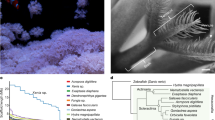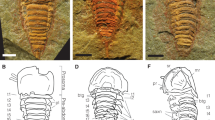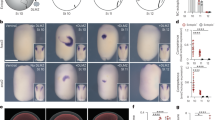Abstract
ATKINS1 has described the post-embryonic development of two British species of Pinnotheres. In P. pisum there are four zooeal stages and one megalopa, and in P. pinnotheres there are two zooeæ and a megalopa. In P. pisum the megalopa stage was reached six weeks after spawning and in P. pinnotheres it was reached after an interval of 21–26 days. Atkins quotes Sandoz and Hopkins2 and Hart3 to the effect that P. ostreum takes 21 days from hatching to megalopa and P. taylori 28 days from hatching to young crab.
This is a preview of subscription content, access via your institution
Access options
Subscribe to this journal
Receive 51 print issues and online access
$199.00 per year
only $3.90 per issue
Buy this article
- Purchase on Springer Link
- Instant access to full article PDF
Prices may be subject to local taxes which are calculated during checkout
Similar content being viewed by others
References
Atkins, D., Proc. Zoo. Soc. Lond., 124 (4), 687 (1955).
Sandoz, M., and Hopkins, S. H., Biol. Bull., Woods Hole, 93, 250 (1947).
Hart, J. F. L., Canad. J. Res., 12, 411 (1935).
Author information
Authors and Affiliations
Rights and permissions
About this article
Cite this article
GOODBODY, I. Abbreviated Development in a Pinnotherid Crab. Nature 185, 704–705 (1960). https://doi.org/10.1038/185704a0
Issue Date:
DOI: https://doi.org/10.1038/185704a0
This article is cited by
Comments
By submitting a comment you agree to abide by our Terms and Community Guidelines. If you find something abusive or that does not comply with our terms or guidelines please flag it as inappropriate.



